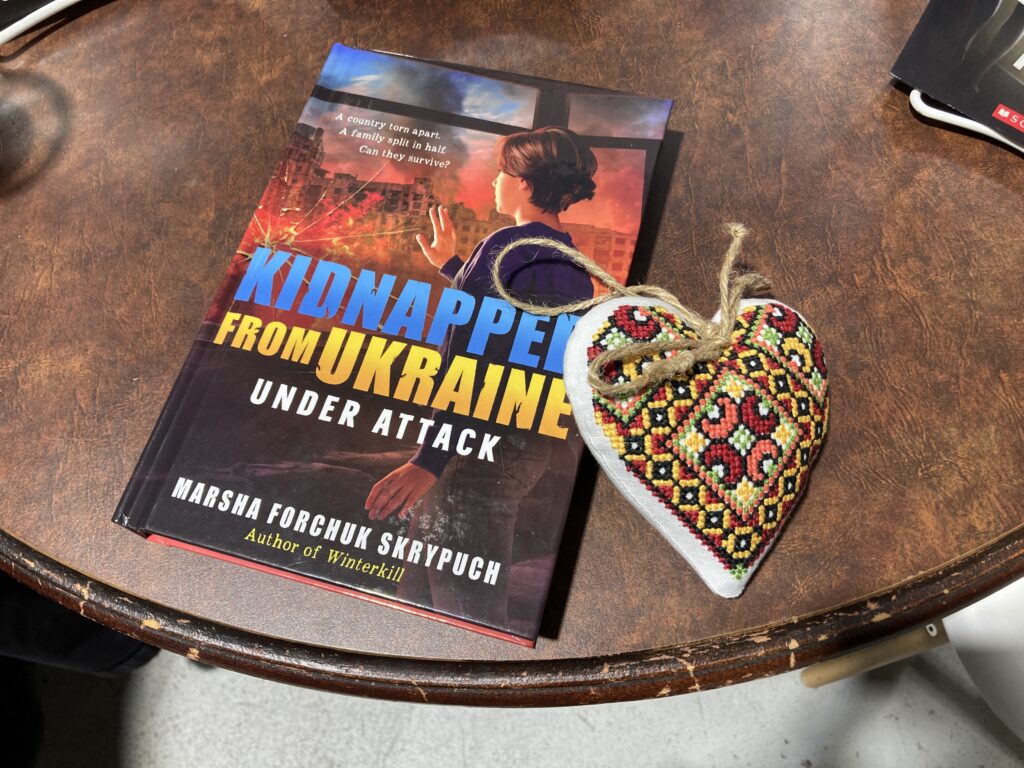
Here’s the link to the interview on Scholastic Canada’s blog.
What inspired you to write your book?
Under Attack was inspired by Russia’s 86-day siege of Mariupol, Ukraine in 2022, and their massive kidnapping campaign of Ukrainian kids.
The book starts on the first day of Russia’s war on Ukraine and it follows the fate of Dariia and her mother as they are separated from the rest of their family. They barely survive, day by day, hour by hour, as missiles rain down. The two are ultimately captured and separated and Dariia is sent to a brainwashing camp in Russia and placed with a Russian family.
This current event that is still unfolding resonates deeply with me, because I had already written a book about it: Stolen Girl, set during the Nazi Lebensborn program in WWII. Putin obviously gains inspiration from Hitler.
What did you enjoy most about writing?
I love shedding light on quiet heroes. As I was doing the research for this book, I was in awe of the brave and creative audacity of individual Ukrainians fighting and sabotaging in each small way that they could against the behemoth that is Russia.
What were some challenges that you faced while writing?
This was an emotionally devasting book to write. I am of Ukrainian heritage.
When writing about a war that’s still going on, one must honour those who are living through it but not betray their privacy. For this reason, the characters are inspired by real people, but for the events, I didn’t use anything that was shared in confidence. Instead, I used documented testimony, interviews, and accounts.
What do you hope your readers will take away from your book?
I want my readers to step into Dariia’s shoes and feel what it’s like to have war come to your home.
How do you come up with the names for your characters?
This novel is set in Mariupol, Ukraine in 2022. In that time and place, there are given names and surnames that are in common use. The names that I use in this book are all derived from real names of people living there in 2022.
What books have had the biggest impact on your life?
I am dyslexic and taught myself how to read when I was nine years old and in grade four for the second time. I chose Charles Dickens’ Oliver Twist as the book I would marathon through until I could read. That book changed my life. Up until that time, I knew how to cheat at reading – guess, memorize, look at pictures – but Oliver Twist required that I actually sound out letters inside of each word and say it out loud to figure out the word. It took me a whole year to read it, but as I became a better reader, the story began to play like a movie in my head. None of the remedial readers that teachers had tormented me with up to that time ever put movies in my head. After reading Oliver Twist, I knew that I wanted to write novels that put movies in people’s heads. And I wanted to write on similar themes like what Charles Dickens did – and if you’ve read my books, you know that I do. But I also decided that I’d leave out the words that people skip over. Dickens was paid by the word, and so he used too many.
What books were your favourite to read growing up?
Because I came to reading in an unusual way, I didn’t select books in a usual way. After reading Oliver Twist, I decided to read all the big fat books in the children’s novel section in alphabetical order by author’s last name. That meant I read all of Louisa May Alcott, Walter Brooks’ Freddie the Pig series, Diary of Anne Frank – because it was mis-shelved with the As, and Black Beauty because it was mis-shelved as a B-authored book. I didn’t get to the end of the alphabet by the time I reached high school and figured out better ways of selecting reading material.
What’s your writing process look like?
I do considerable research before I start writing, and then kamikaze research during. My standard routine is to write for three hours a day and that three hours would consist of reading and revising what I’d written the day before, and then plunging forward on new scenes. Beginning a novel is always the hardest and I can rewrite the first 25% of a novel over and over again before finally getting it to gel and then I’m off galloping. Once I get to THE END for the first time, revision starts. The first draft usually takes about six months and the edits can take a similar length of time.
What’s next for you?
I’m working on a story about a real girl in the medieval times who’s captured as a slave and becomes a queen. It may or may not end up being a trilogy.
